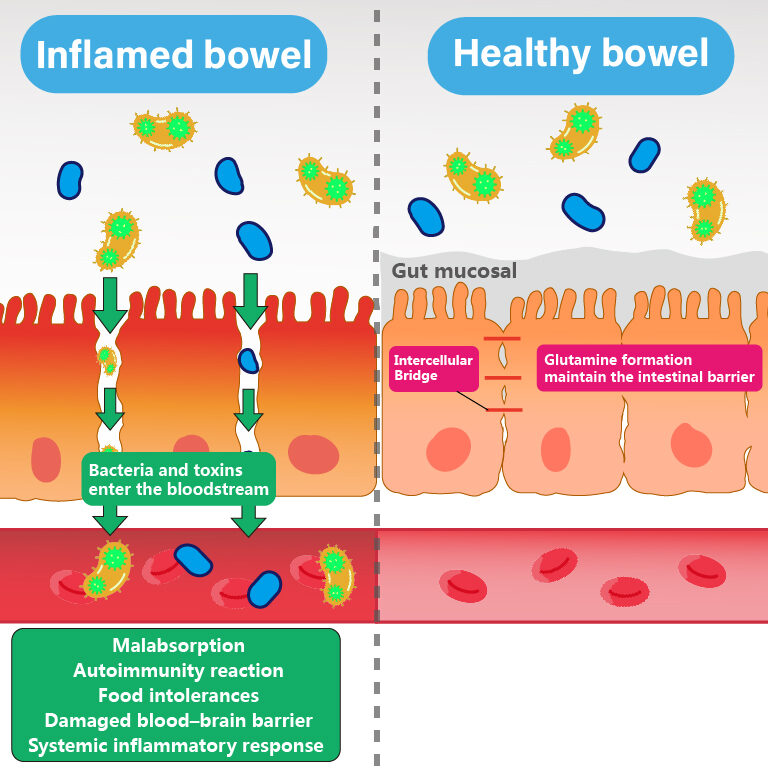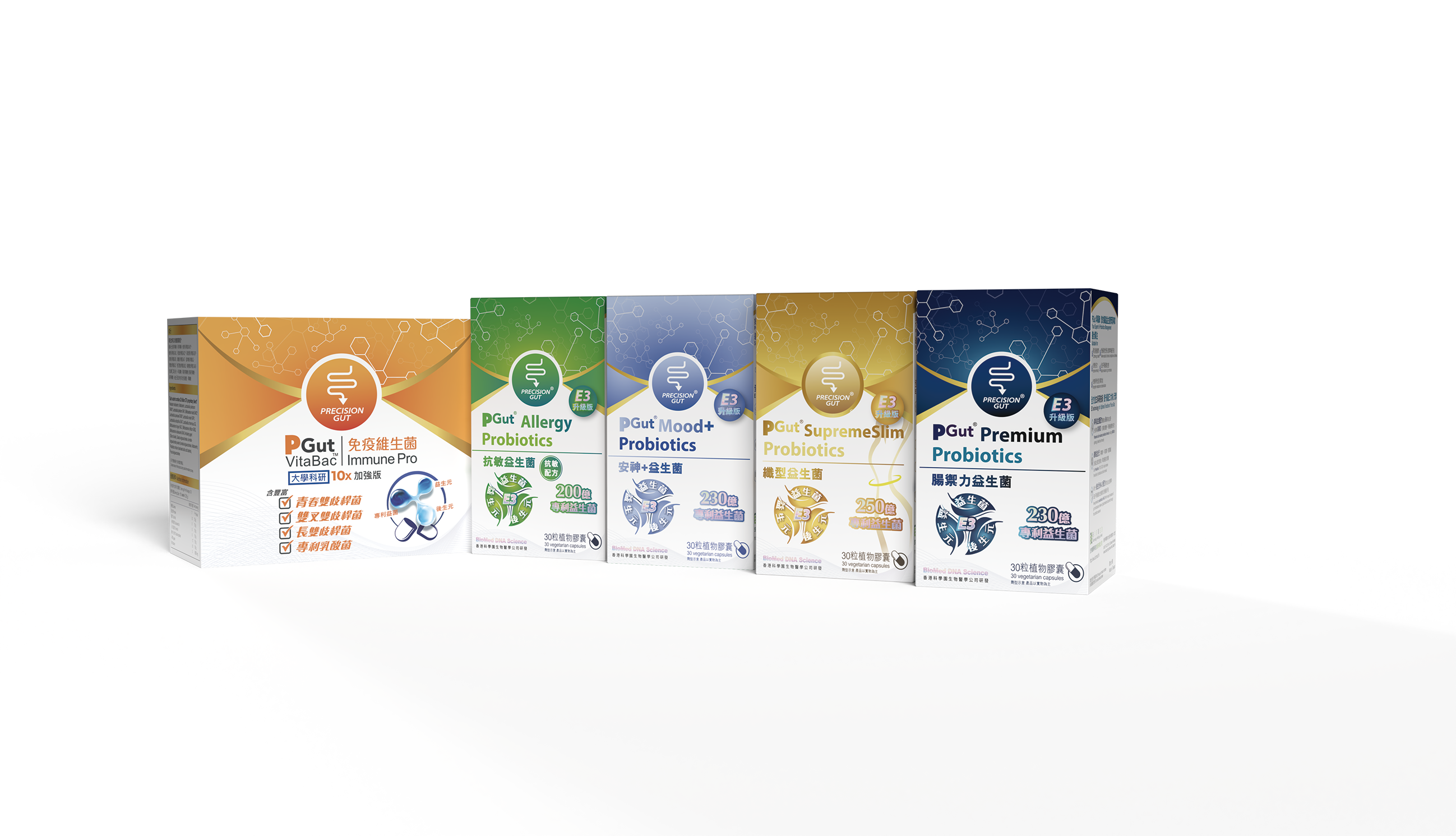Probiotics aid to improve intestinal barrier function, prevent leaky gut syndrome and stop the invasion of bad bacteria.

Intestine – A “firewall” in our body
Our intestine is made up of a thin layer of mucosal cells. These cells are closely linked to each other and act as a firewall in our body.
Digestive enzymes in the gastrointestinal tract break down normally eaten food into small molecules. These small molecules are absorbed by the blood through the intestinal mucosa or intercellular space, and then enter the liver and veins, water in the dregs is absorbed into the large intestine, remaining parts become feces. In other words, mucosal cells are responsible for absorbing the nutrients we need, also for stopping the invasion of harmful substances.
However, once these mucosal cells are not tightly linked, the gaps between cells increase and thus intestinal permeability increases, which is commonly known as “leaky gut”. When suffering from leaky gut syndrome, the chance of invasion of bad bacteria or other harmful substances is greatly increased, which then activates the immune system to release antibodies to fight against invaders, the body shows chronic inflammation symptoms. If the situation persists, it will cause chronic damage to the body, and it is more likely to become a disease that affects the whole body.
Preventing leaky gut is the key to boost body’s immunity.
Symptoms of leaky guts
According to researches, increased intestinal permeability, known as “leaky gut”, increases the chances of the following symptoms:
- Alzheimer’s disease
- Anxiety and Depression
- Attention deficit, hyperactivity disorder
- Autism
- Migraine
- Abdominal bloating, dyspepsia
- Rheumatoid arthritis
- Chronic fatigue syndrome
- Long-term inability to lose weight or gain weight (lack of nutrition of a certain food, but allergy to the same food)

Cause of leaky gut, why there is an increase in intestinal permeability?
In general, a leaky gut (increased intestinal permeability) is mainly caused by two reasons – a weak self-defense system and too many foreign substances invading the intestinal mucosa:
First of all, in terms of self-defense, the intestine mainly relies on the intestinal mucosa to defend against foreign invasion. Any damage to the intestinal mucosa will increase the “intestinal permeability”. Medications, excessive alcohol intake, a diet in refined starch/low fiber, and an imbalance in Omega-3/Omega-6 fat intake can impair intestinal mucosal integrity, reduce its defense and increase the risk of leaky gut.
Secondly, in terms of foreign invasion, as long as the intestinal tract accumulates too much foreign matter, it will increase the probability of the intestinal mucosa being invaded. Common examples are shown below:
- Too many bad bacteria in the gut, producing too much endotoxin
- Eat allergic food
- Insufficient digestive enzymes in the body (overeating, insufficient pancreas/gallbladder function or removal), resulting in incomplete breakdown of food
- 4. Insufficient gastric acid (long-term intake of gastric acid inhibitors, gastrectomy), resulting in incomplete decomposition of food, an increase of macromolecular protein allergens and reduced nutrient absorption and reduced nutrient absorption, and unable to play the role of first-line sterilization.
- Appearance of infectious agents (parasites, candida infections), etc.

How can probiotics reduce intestinal permeability and prevent “leaky gut” ?
- Probiotics reduce bad bacteria in the gut, break down harmful substances, and metabolize drugs, they attach to the intestinal mucosal epithelium and compete with bad bacteria for nutrients and proliferation sites, which effectively suppress the growth and reproduction of bad bacteria, and probiotics will produce different antibacterial substances, such as organic acids, enzymes, hydrogen peroxide, bacteriocins, antimicrobial peptides, or compete with pathogens so that they cannot engage with the host’s cells, which can prevent “leaky gut” and protect intestinal health.
- Probiotics can regulate the immune system and fight allergies, helping to control the inflammatory intestinal disease. Probiotics work by reconciling the balance between triggering and suppressing immune response mechanisms, such as regulating the number and activity of Th1 and Th2 in helper T cells, adjusting the content of different cytokines to achieve homeostasis, and reducing intestinal allergic reactions and thus the risk of “leaky gut”. They can be applied to atopic dermatitis, asthma, allergic rhinitis, food allergies, and other allergy-related diseases.
- Probiotics maintain tight junctions in gut cells, preventing harmful bacteria and viruses from invading. They can promote intestinal wall cells to secrete mucus and mucin, reduce the chance of intestinal epithelial cells coming into contact with pathogenic bacteria and harmful substances, and lubricate the intestines, a natural barrier is formed to reduce intestinal permeability and prevent “leaky gut”.
- Probiotics produce a variety of enzymes to digest food and produce many vitamins, folic acids, amino acids, and other substances that the human body needs. These can relieve gastroenteritis and diarrhea, including taking antibiotics and suffering from irritable bowel syndrome (IBS). or diarrhea caused by Clostridioides difficle infection. In addition, patients with inflammatory bowel disease (IBD) often have abnormal gut microbial composition, probiotics have the function of reducing inflammation, and they produce short-chain fatty acids (SCFAs). Reduce the degree of inflammation, promote the restoration of microbial ecological balance in the intestinal tract, and restore the tight connection of mucosal cells to prevent a “leaky gut”.
Prevent “leaky gut”, different probiotics have different barrier functions
After determining the cause of the increase in intestinal permeability, choosing appropriate probiotic supplementation help us repair the intestinal mucosa, prevent leaky gut, regulate the lymphatic tissue of the intestinal mucosa, and restore the intestinal health.



